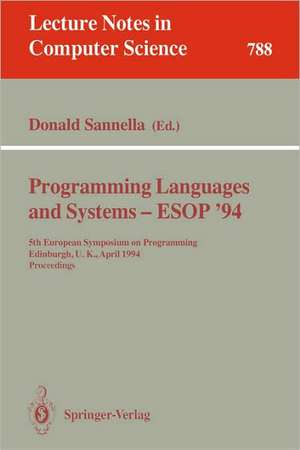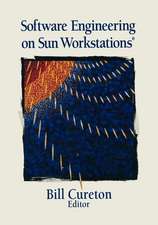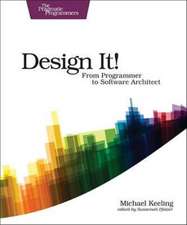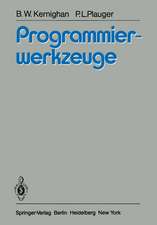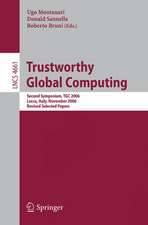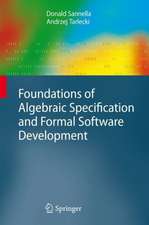Programming Languages and Systems - ESOP '94: 5th European Symposium on Programming, Edinburgh, U.K., April 11 - 13, 1994. Proceedings: Lecture Notes in Computer Science, cartea 788
Editat de Donald Sannellaen Limba Engleză Paperback – 23 mar 1994
Din seria Lecture Notes in Computer Science
- 20%
 Preț: 1061.55 lei
Preț: 1061.55 lei - 20%
 Preț: 307.71 lei
Preț: 307.71 lei - 20%
 Preț: 438.69 lei
Preț: 438.69 lei - 20%
 Preț: 579.30 lei
Preț: 579.30 lei -
 Preț: 410.88 lei
Preț: 410.88 lei - 17%
 Preț: 427.22 lei
Preț: 427.22 lei - 20%
 Preț: 596.46 lei
Preț: 596.46 lei - 15%
 Preț: 448.04 lei
Preț: 448.04 lei - 20%
 Preț: 353.50 lei
Preț: 353.50 lei -
 Preț: 389.49 lei
Preț: 389.49 lei - 20%
 Preț: 309.90 lei
Preț: 309.90 lei - 20%
 Preț: 645.28 lei
Preț: 645.28 lei - 20%
 Preț: 763.23 lei
Preț: 763.23 lei - 15%
 Preț: 580.46 lei
Preț: 580.46 lei - 20%
 Preț: 310.28 lei
Preț: 310.28 lei - 20%
 Preț: 655.02 lei
Preț: 655.02 lei - 20%
 Preț: 1183.14 lei
Preț: 1183.14 lei - 20%
 Preț: 340.32 lei
Preț: 340.32 lei -
 Preț: 449.57 lei
Preț: 449.57 lei - 20%
 Preț: 591.51 lei
Preț: 591.51 lei - 18%
 Preț: 938.83 lei
Preț: 938.83 lei - 20%
 Preț: 337.00 lei
Preț: 337.00 lei - 20%
 Preț: 649.50 lei
Preț: 649.50 lei - 20%
 Preț: 607.40 lei
Preț: 607.40 lei - 20%
 Preț: 1414.79 lei
Preț: 1414.79 lei - 20%
 Preț: 1024.44 lei
Preț: 1024.44 lei - 20%
 Preț: 583.40 lei
Preț: 583.40 lei - 20%
 Preț: 453.32 lei
Preț: 453.32 lei - 20%
 Preț: 575.49 lei
Preț: 575.49 lei - 20%
 Preț: 1075.26 lei
Preț: 1075.26 lei - 20%
 Preț: 585.88 lei
Preț: 585.88 lei - 20%
 Preț: 825.93 lei
Preț: 825.93 lei - 17%
 Preț: 360.20 lei
Preț: 360.20 lei - 20%
 Preț: 763.23 lei
Preț: 763.23 lei - 20%
 Preț: 340.32 lei
Preț: 340.32 lei - 20%
 Preț: 504.58 lei
Preț: 504.58 lei - 20%
 Preț: 369.13 lei
Preț: 369.13 lei - 20%
 Preț: 580.93 lei
Preț: 580.93 lei - 20%
 Preț: 343.62 lei
Preț: 343.62 lei - 20%
 Preț: 350.21 lei
Preț: 350.21 lei - 20%
 Preț: 583.40 lei
Preț: 583.40 lei - 20%
 Preț: 583.40 lei
Preț: 583.40 lei - 15%
 Preț: 438.59 lei
Preț: 438.59 lei - 20%
 Preț: 341.95 lei
Preț: 341.95 lei - 20%
 Preț: 238.01 lei
Preț: 238.01 lei - 20%
 Preț: 538.30 lei
Preț: 538.30 lei
Preț: 344.27 lei
Preț vechi: 430.34 lei
-20% Nou
Puncte Express: 516
Preț estimativ în valută:
65.88€ • 71.54$ • 55.34£
65.88€ • 71.54$ • 55.34£
Carte tipărită la comandă
Livrare economică 23 aprilie-07 mai
Preluare comenzi: 021 569.72.76
Specificații
ISBN-13: 9783540578802
ISBN-10: 3540578803
Pagini: 532
Ilustrații: IX, 523 p.
Dimensiuni: 155 x 235 x 28 mm
Greutate: 0.74 kg
Ediția:1994
Editura: Springer Berlin, Heidelberg
Colecția Springer
Seria Lecture Notes in Computer Science
Locul publicării:Berlin, Heidelberg, Germany
ISBN-10: 3540578803
Pagini: 532
Ilustrații: IX, 523 p.
Dimensiuni: 155 x 235 x 28 mm
Greutate: 0.74 kg
Ediția:1994
Editura: Springer Berlin, Heidelberg
Colecția Springer
Seria Lecture Notes in Computer Science
Locul publicării:Berlin, Heidelberg, Germany
Public țintă
ResearchCuprins
A theory of primitive objects.- Pi-nets: A graphical form of ?-calculus.- Local type reconstruction by means of symbolic fixed point iteration.- An asynchronous process algebra with multiple clocks.- Foundational issues in implementing constraint logic programming systems.- Programming with behaviors in an ML framework — The syntax and semantics of LCS.- Characterizing behavioural semantics and abstractor semantics.- Extending pruning techniques to polymorphic second order ?-calculus.- ?-definition of function(al)s by normal forms.- Simulation of SOS definitions with term rewriting systems.- Strategies in modular system design by interface rewriting.- Symbolic model checking and constraint logic programming: A cross-fertilization.- A logical denotational semantics for constraint logic programming.- Compilation of head and strong reduction.- Suffix trees in the functioned programming paradigm.- Type classes in Haskell.- Lazy type inference for the strictness analysis of lists.- Lazy unification with simplification.- Polymorphic binding-time analysis.- Shapely types and shape polymorphism.- Bottom-up grammar analysis — A functional formulation.- First-class polymorphism for ML.- Dimension types.- A synergistic analysis for sharing and groundness which traces linearity.- A ?-calculus specification of prolog.- A logical framework for evolution of specifications.- A semantics for higher-order functors.- The PCKS-machine: An abstract machine for sound evaluation of parallel functional programs with first-class continuations.- A tiny constraint functional logic language and its continuation semantics.- Fully abstract translations and parametric polymorphism.- Broadcasting with priority.- Towards unifying partial evaluation, deforestation, supercompilation, and GPC.-Algebraic proofs of properties of objects.
